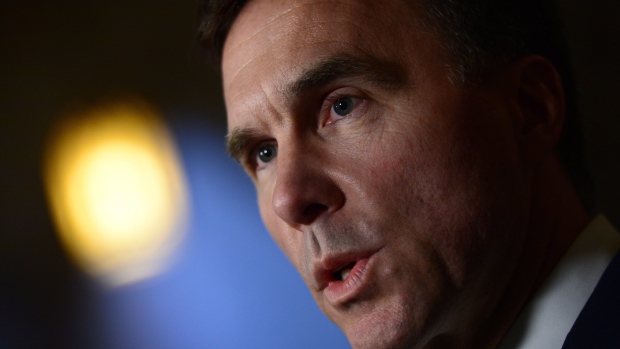Mar 21, 2017
Trump’s shadow raises the stakes for Morneau's second federal budget
By Greg Bonnell

With speculation swirling that Ottawa will once again target the rich in Wednesday’s budget, Canada’s business community is warning against dramatic tax moves that would undermine the innovation economy and weaken the country’s competitive position in the face of Trump uncertainty.
In the words of one of Canada’s most influential business leaders, Stephen Jarislowsky, the Trudeau Liberals need to “come to their senses.”
Facing a string of deficits with no clear route back to balance, Finance Minister Bill Morneau does appear reluctant to dig himself deeper into that hole. On the sidelines of the G20 meeting in Germany this past weekend, Morneau vowed to keep the country’s net-debt-to-GDP ratio on a “declining path.”
“We think that… shows a sense of fiscal responsibility that allows us to make investments with confidence and not find ourselves in more difficult fiscal situations down the road,” he said.
While new, big ticket-spending items aren’t expected in this week’s fiscal plan, the concern is about a hunger for revenue to counter deficit spending in the tens of billions.
And the country’s top earners, the so-called one per cent, have been prime targets for the Liberals as they promise tax fairness. Recall after the 2015 election, when taxes were raised on the ultra-wealthy to fund cuts for middle-income earners.
This year, there’s concern over changes to the taxation of capital gains. Right now, half of a capital gain is subject to tax, given the inclusion rate of 50 per cent.
Critics say it’s a policy that overwhelmingly benefits the wealthy. Defenders of the policy say a higher inclusion rate – say 66 or even 80 per cent as some fear – would stifle the very investment needed to grow Canada’s innovation economy.
“We’re trying to rebuild our economy and I don’t think you rebuild the economy by chasing people away who could deliver jobs and build corporations,” Jarislowsky, former president of Jarislowsky Fraser, told BNN in an interview.
“The existing entrepreneurs will say, why stay in Canada?”
HAVE YOUR SAY

Which of these potential budget announcements is most important to you?
While potential changes to the capital gains tax are taking the spotlight, some investors worry that nothing is off the table – including lowering or eliminating the dividend tax credit.
“This one scares me the most,” David Prince, founder and president of Harbinger Capital Markets, told BNN in an interview.
“There’s an awful lot of people in the country who are older who depend on that for their living.”
Compounding the fears of changes to capital gains and dividend treatment is the policy uncertainty surrounding the Trump administration; namely, tax cuts that would make our largest trading partner much more competitive.
“We are going to see a big shift in taxation south of the border… we don’t know how much,” Craig Alexander, chief economist at the Conference Board of Canada, told BNN in an interview Monday.
Alexander says the government must “pay attention to the competitive angle.”
“They should be very careful about announcing lots of new taxations measures in the federal budget.”
Jarislowsky agrees, adding he felt that “instead of embarrassing [the Liberals] by objecting after they put something in which is ill-conceived… I should speak beforehand so they can come to their senses.”
Beyond the concern about tax changes for investors, the budget is expected to outline plans for an infrastructure bank. The idea is use $35 billion in public funds to attract some $140 billion in private cash to fund Canadian infrastructure projects.
While details are “scarce” at this point, TD Senior Economist Brian DePratto says it has the potential to deliver “big results.”
The catch is that the infrastructure bank will have to make it worth it for private investors to invest.
To that end, DePratto notes in a report published Monday that the bank is set to focus on revenue-raising projects with the “potential for private ownership” of assets to attract that $140 billion.
Simply put, infrastructure investors put money to work looking for returns – not unlike Canadians investing in the stock market.

